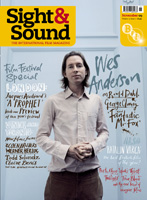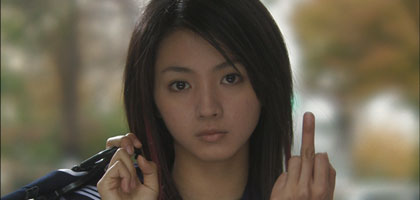Primary navigation

Japan 2008

Reviewed by Trevor Johnston
Our synopses give away the plot in full, including surprise twists.
The death of schoolboy Yu's religious mother prompts his father Tetsu to take up the priesthood. Tetsu tries to force Yu to confess his sins, and in order to comply, Yu joins a gang using martial-arts techniques to take upskirt photographs. Dressed as female crimefighter 'Miss Scorpion' - a forfeit to his comrades - he steps in to protect schoolgirl Yoko from a street assault. They instantly fall in love, and a flash of her panties gives him his first erection. As 'Miss Scorpion' he can't reveal his ardour, a frustration intensified when Yoko and her stepmother Kaori move in with fallen clergyman Tetsu, making Yu and Yoko effectively siblings. However, events are secretly being manipulated by vengeful Koike, a recruiter for the religious cult Zero Church. She enrols at Yu and Yoko's school and exposes Yu as an upskirt photographer. Yoko pours scorn on Yu's declaration that he's actually 'Miss Scorpion', the shame causing her to join the Zero Church. Failing to de-programme Yoko in the course of an abduction, Yu joins the cult and feigns obedience, only revealing his true colours when he kills the cult leader and insists he's not ashamed of his perverse affections, prompting crestfallen Koike to commit suicide. Yoko moves in with relatives; seeing her young cousin falling in love makes her realise she was wrong about Yu. She visits him in the insane asylum, where he's regressed into 'Miss Scorpion'. However, Yu's memory and his erection return, and after fleeing the asylum he touches hands with Yoko through the smashed window of a patrol car.
It's clear that writer-director Sono Sion has given much thought to schoolgirls' panties as a marker - in Japanese society at least - of the tensions between desire and morality. Sono's protagonist Yu may still be at school but his agility and application make him a skilled practitioner in the pantie-snapping realm of tosatsu - clandestine photography - though the salient point about him, of course, is that he's no ordinary pervert, or hentai. Yu's odyssey, in this monumental 237-minute amalgam of comic-strip action, archetypal comedic patterning, intense psychodrama and thoughtful moral inquiry, is to realise that for him, since desire and love are inseparable, it's possible to be "hentai with dignity", to assert his longings without shame. While the social context for all this, not to mention the evident manga-influenced stylings, might seem inescapably Japanese, Love Exposure's key questions resonate much wider. In a world where sexual urgings sustain an exploitative pornography industry and perpetrate numerous moral transgressions, Sono seems to be pondering, can desire ever remain untainted and somehow innocent?
Among the great strengths of this remarkable film is the way such weighty issues are dramatised through the machinations of the story. Its seriousness, and indeed its utter sincerity, lurk behind layers of seemingly superficial naughtiness (the upskirt training school, combining kung-fu moves and compact digital cameras, is a hoot), floridly exaggerated bloodletting and hokey plot devices from the dawn of comedy itself. So, the catch that Yu's romantic affections are only returned by his beloved Yoko when he's disguised as a woman, for instance, is a fiendish way of turning his desire into shame, since the hard-on rising tent-like from his alter-ego Miss Scorpion's flowing robes would be an embarrassing giveaway. Yoko becoming his de facto stepsister whose bedroom is but a sliding screen away merely ratchets up his agonies, and clearly an inadvertent erection when smiling at your more-or-less sibling in high school is another faux pas. Far, far worse is to come though, when Yu's previously secret double-life as a pantie-snapper is cruelly exposed by yet another twist in Sono's labyrinthine design.
Sono's previous work has run the gamut from highly personal video art to manga-style fantasy and horror with a social conscience (Suicide Club, Exte: Hair Extensions), yet the ambition and achievement here make Love Exposure a career milestone in no uncertain terms. Allegedly trimmed down from an initial six-hour assembly, it's certainly not overlong at just under four, such is the immersive complexity resulting from its conjunction of alternately madcap and trashy incident, sustained character development and, perhaps surprisingly, spiritual rumination. Here's a film that quotes a long section of Corinthians as a key thematic underscoring, yet also uses male tumescence as a major plot device and indeed a talismanic symbol of the resilience of true love. Academic theses will, in the course of time, no doubt be written on the film's rich playoff between (and doubling of) true and phoney modes of religious practice (core Christian values versus the ersatz teachings of controlling cults) and indeed sexuality (Yu's innocent longing versus the destructive rapaciousness of the story's various abusive father-figures) - not to mention its recasting of the pejorative term hentai to suggest that enlightenment can lie on the wrong side of societal standards - hence the disarmingly unironic Christian motifs throughout the proceedings.
In celluloid terms, the film's combination of below-the-belt humour, frolicsome farce and unexpected emotional potency perhaps recalls prime Almodóvar, while even Rivette might envy the long-form control of the shifting plates of its narrative. That said, perhaps the most appropriate epithet lies elsewhere, for in its proudly confident layering of the high-falutin' and the low-slung, its insistence that the portals of vulgarity offer the truest perspective on the human condition, it can really only be called Shakespearean. It's a description that precious few films of the past decade might warrant, but one that Love Exposure deserves. Triumphantly.